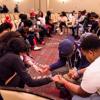Even on the other side of the world, I feel as though I’m brought back home by the different iterations of hospitality — from my family, my friends, and my Filipino heritage — and how all of them flow from the hospitable God who has welcomed us all to partake in his kingdom.
Ethnicity, Reconciliation, and Justice
When we build cross-cultural relationships and live life with a diversity of people, we see other angles and pieces of the puzzle; we experience the fullness of life as God intended.
My first encounter with racial reconciliation occurred at Duke University. Black students coordinated a sit-in at the administrative building to encourage dialogue around racial issues on campus.
We had the opportunity to sit down with the Director of InterVarsity’s LaFe, Orlando Crespo. He shared about how God is using LaFe in this generation of students on campus and what he’s most excited about.
It’s impossible to celebrate Asian American and Pacific Islander Heritage Month without honoring our elders by receiving their stories and stoking fires of hope and tenacity for our children to encourage them for a life worthy of this calling.
It’s easy to see our parents only in terms of their parental role. We often forget that they are people, who are growing and learning just like us. We must learn to understand their stories.
For years, InterVarsity’s Black Campus Ministries (BCM) has been faithful in creating spaces for Black college students to engage the gospel and their blackness.
I once had a picture in my mind of several pottery jars. Some had First Nations designs on them, some Celtic, some African, Asian, and many more. I saw a hand pouring water into each pottery jar. It was like Creator (God) was saying to me that he has poured some portions of his gifts of grace into each ethnic group.
And as we consider one of the core tenets of our faith, that Jesus’ work on the cross reconciles us both to God and others (Eph 2:14–17), we see this as the foundation for biblical reconciliation. Jesus, and Jesus alone, is the basis for the unity that we believe already exists among God’s people of every ethnicity and culture.
So how can you support Asian American students, faculty, and staff on campuses and the whole Asian American ‘ohana in this trying time?
Pagination
- Previous page
- Page 2
- Next page









